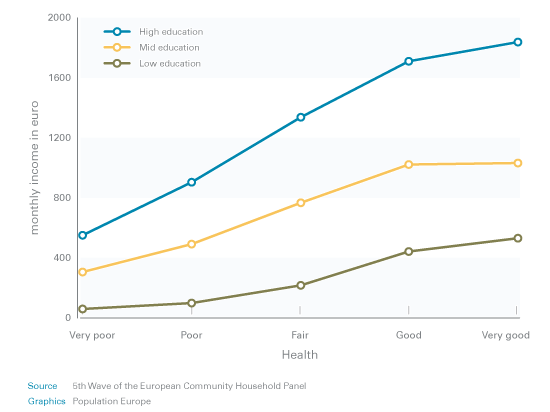In many countries, health is distributed very unevenly across society, meaning that people with lower levels of education, occupation or income tend to have systematically higher morbidity and mortality rates. Beyond doubt, such health inequalities lead to economic cost. But how much? Johan P. Mackenbach from Erasmus University Rotterdam and his colleagues present the first data for the European Union.
Hypothetical: A high socioeconomic position for everybody
When discussing opportunities for reducing health inequalities, most analyses conclude that policies should aim for an ‘upward levelling’ approach by which the higher rates of morbidity and mortality of the lower socioeconomic groups are reduced to the level of more advantaged groups in society. The authors used this perspective for their analyses: They compared the current situation in European countries to a hypothetical situation in which everyone had the health status correspondent to a high socioeconomic position. Through this they could determine how many cases of premature death and ill health are attributable to health inequalities. In a second step, various economic effects of those health losses were calculated.
Many years of life lost due to health inequalities
In the European Union, the number of deaths that can be attributed to health inequalities amount to more than 700,000 deaths per year. This is the difference between the 4.6 million deaths that currently occur each year in the EU-25 as a whole, and the 3.9 million that would occur in an ‘upward levelling’ counterfactual scenario. Assuming that on average around 16 years are lost per death, the number of years of life lost due to health inequalities is about 11.3 million. With respect to morbidity, Mackenbach and colleagues estimate that the number of persons in “less than good” health (self-assessed) could be reduced by 33 million cases if the health status of all Europeans would be improved to the average health level of higher educated people.
The impact of health inequalities on economy and welfare
Persons with ‘very good’ or ‘good’ health have about four times higher earnings than those with ‘poor’ and ‘very poor’ health (figure 1). The main cause of lower earnings among those with poor health is their lower labour force participation: People with ‘very poor’ health are about two times less likely to participate in the labour force than those with ‘very good’ health.

Fig. 1: Large differences in the level of personal earnings according to the general health of people.
How much does it cost when health problems cause part of the population to be less likely to be productive and engage in labour activities? Such estimates of inequality-related losses to health as a ‘capital good’ seem to be modest in relative terms (1.4% of gross domestic product (GDP) each year), but are already large in absolute terms (€141 billion).
In addition, health directly contributes to an individual’s happiness and satisfaction, given that a good health status enables the enjoyment of work and leisure activities. Valuing health as such (‘consumption good’), the monetary value of health inequality-related welfare losses is estimated to be €980 billion per year or 9.4% of GDP.
These losses account for 15% of the total costs of social security systems (e.g. unemployment and disability benefits) and 20% of the total costs of healthcare systems (e.g. physician and hospital services).
The authors emphasise that all the estimates represent only yearly values. As long as health inequalities persist, losses will continue to accumulate over the years. Although the estimates should be seen as a first attempt and are surrounded by considerable uncertainty, the results suggest that the economic costs of health inequalities are substantial and, if confirmed in further studies, should warrant significant investments in policies and interventions to reduce them.
This PopDigest is also available in French, Spanish and German.
This volume has been published with financial support of the European Union in the framework of Population Europe.